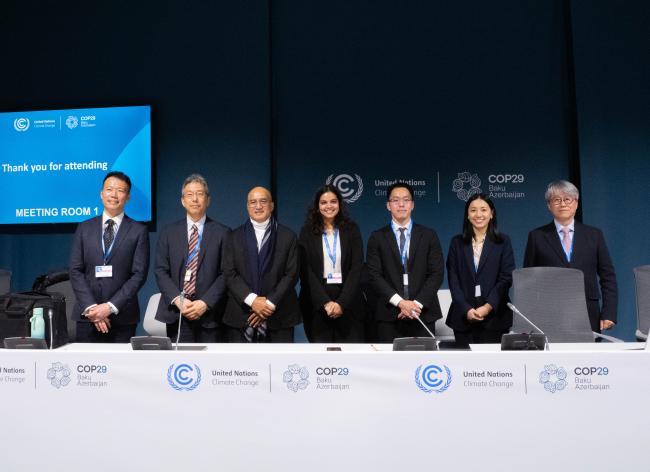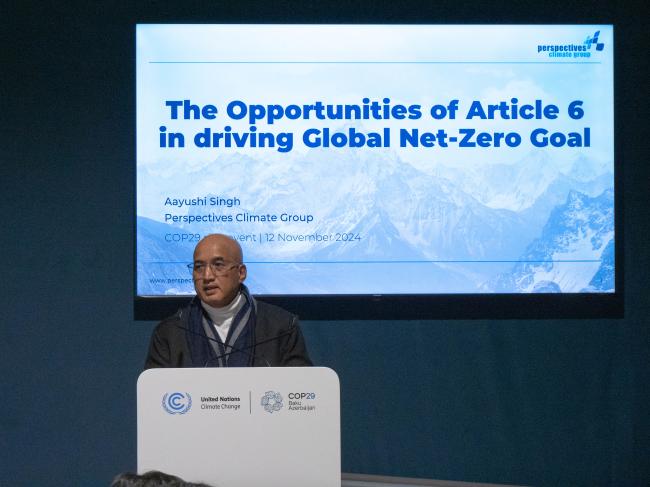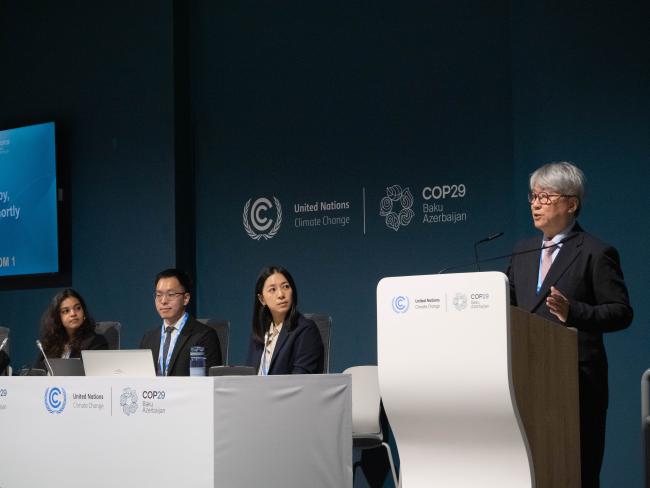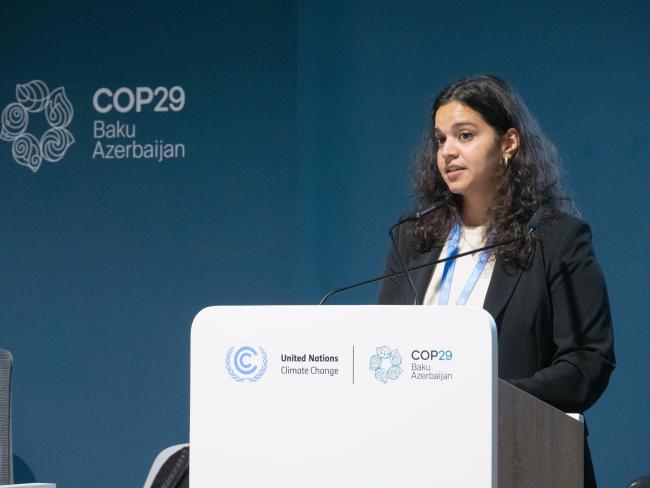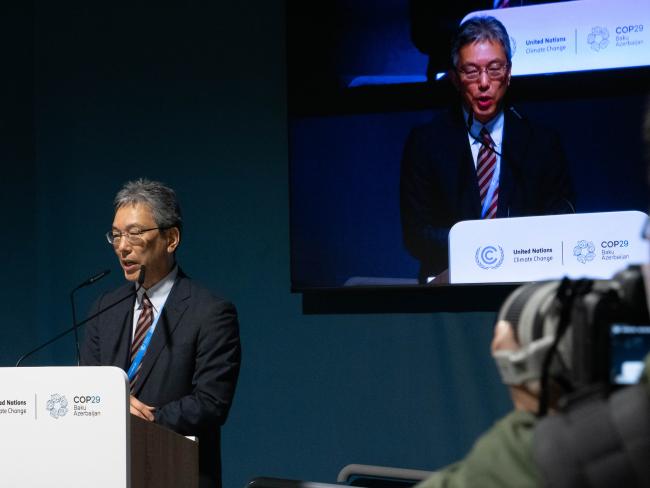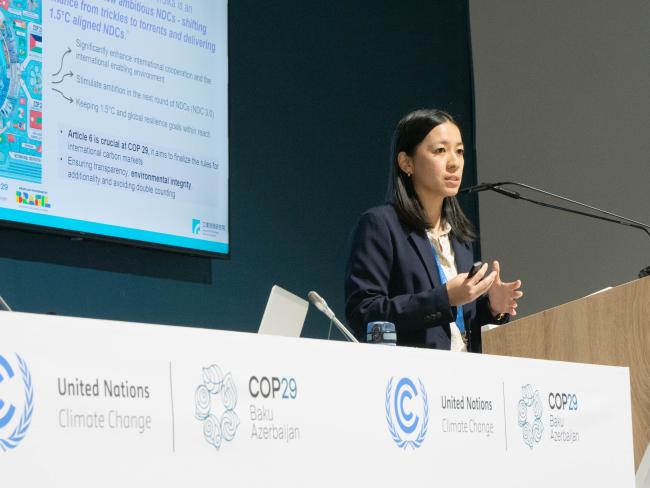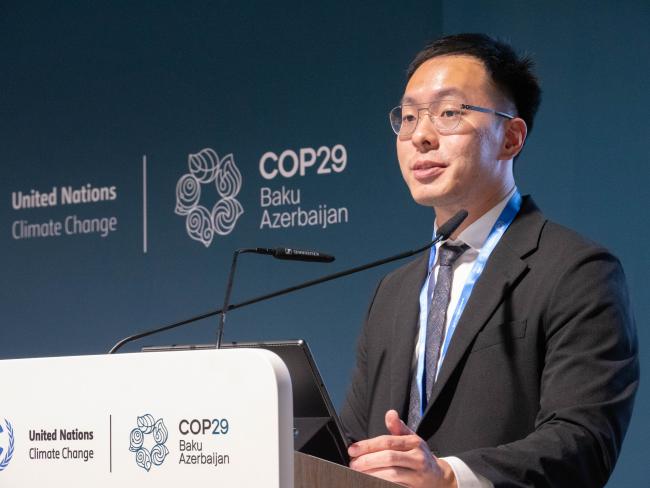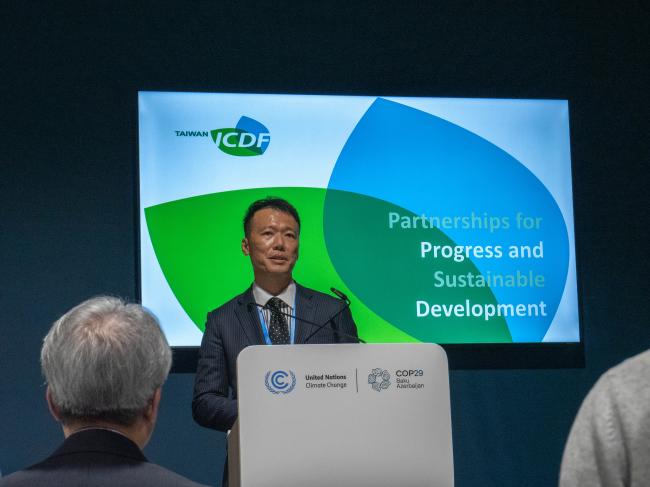About
Over the past few years, different voluntary market mechanisms were developed to tackle climate change. From decarbonization initiatives to carbon market schemes, this side event shared examples of innovative strategies and collaborations under Art. 6 to accelerate the global transition to net-zero emissions.
Development of voluntary market mechanisms under Article 6 of the Paris Agreement is crucial to accelerate the global transition to net-zero emissions by 2050. As a result, more countries are leveraging technology and utilizing market-based mechanisms by partnering with other countries, financial institutions, and the private sector to develop and implement these approaches. This side event explored examples of innovative strategies and collaborative partnerships that can pave or are paving the way for successful implementation of voluntary market mechanisms.
Chien-Te Fan, National Tsing Hua University, moderated the event. In welcoming remarks, Clarence Samuel, Director, Climate Change Directorate, Ministry of Environment, Marshall Islands, shared how Taiwan has been a “true and reliable” partner to the Marshall Islands in addressing the impacts of climate change through the provision of financial support, capacity building, and sustainable development initiatives. Given Taiwan’s commitment to supporting other countries in combating climate change, he called on countries to support the recognition of Taiwan under the Paris Agreement and the UN Framework Convention on Climate Change (UNFCCC) to enable its constructive participation in COP 29 and continue its work alongside the international community in achieving a net-zero world.
Aayushi Singh, Perspectives Climate Group, discussed how carbon markets can be used as a tool to combat climate change, including incentivizing carbon reduction and addressing gaps in technology development and the capacity of countries. She emphasized that carbon markets can contribute to the Paris Agreement’s goals and the Sustainable Development Goals (SDGs) only if the integrity of carbon markets is maintained following the principles of: additionality; avoidance of double counting; observance of the do-no-harm principle; reversals and leakages; and use of validation and verification. She lauded the recent adoption of standards by the Article 6.4 Supervisory Body for the creation of carbon credits, considering it crucial for the successful operationalization of carbon markets.
Hiroshi Ono, Executive Director, Institute for Global Environmental Studies (IGES), shared the experience of Japan and IGES in the implementation of Article 6 through partnerships with other countries and the private sector. He discussed Japan’s roadmap to achieve the 1.5°C temperature goal, which includes its initiatives to realize the required reduction of greenhouse gas emissions, rapid expansion and deployment of renewable energy sources, and contribution to decarbonization to enhance energy efficiency and the productivity of businesses. He emphasized the importance of cities and sub-national government initiatives, noting the role they play in decarbonization efforts, and stressed the role of IGES in supporting implementation of these initiatives.
Wei-chen Tsai, Industrial Technology Research Institute (ITRI), underscored the growing number of countries interested in engaging in carbon markets and promoting bilateral agreements to serve as a foundation for the Article 6 mechanisms. She emphasized the importance of authorizations of Internationally Transferred Mitigation Outcomes (ITMOs) and corresponding adjustments to environmental integrity. Aside from noting the opportunities for Taiwan to use credits from these mechanisms to meet its Nationally Determined Contribution targets, she also discussed Taiwan’s introduction of policies to facilitate a low-carbon economy, such as the promotion of renewable energy and the use of carbon pricing mechanisms. She outlined Taiwan’s carbon fees scheme and crediting mechanisms and ITRI’s role in advancing carbon governance, which includes initiating and facilitating linkages between different stakeholders and designing and implementing carbon pricing policies.
Supanut Chotevitayatarakorn, Paris Agreement Article 6 Implementation Partnership (A6IP) Center, shared his organization’s experiences with the implementation of Article 6. He highlighted their work with partner countries, organizations, and the private sector and the creation of thematic working groups to help develop these partnerships. He discussed the A6IP Center’s global support package and contribution to facilitating global cooperation towards high integrity Article 6 implementation, which includes capacity building, development of information platforms, and technical assistance.
Ming-Hong Yen, Director, Department of Technical Cooperation, International Cooperation and Development Fund (ICDF), discussed ICDF’s work in enhancing net-zero through low-carbon transformation and technology innovations, one of which is through the development of public-private sector partnerships in other countries. He explained that by focusing on six areas— agriculture, education, environment, development of small and medium-sized enterprises (SMEs), public health, and information and communications technology—Taiwan is able to respond to other countries’ needs and deliver technical assistance, education and training, lending and investments, and humanitarian assistance. He shared examples of ICDF’s work on circular agriculture in Marshall Islands, collaboration with the International Rice Research Institute (IRRI) on capacity building for sustainable and low-carbon rice innovation, and green energy projects in small island developing States in the Pacific.
A Q&A session focused on the panel speakers’ experiences with the implementation of a new asset class to finance the decommissioning of coal-fired power plants. Speakers also shared actions taken to facilitate the phase out of coal-fired power plants.
Organizers: Marshall Islands, ITRI, and International Climate Dialogue e.V.
Contact: Wei-chen Tsai | weichen.tsai@itri.org.tw
Websites: https://www.itri.org.tw; https://www.international-climate-dialogue.net
To receive free coverage of global environmental events delivered to your inbox, subscribe to the ENB Update newsletter.
All ENB photos are free to use with attribution. For 2024 UN Climate Change Conference Baku - Side Events , please use: Photo by IISD/ENB | Andres Carvajal

